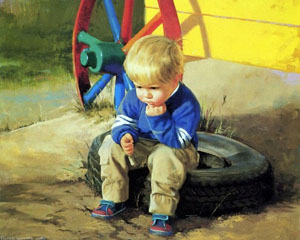The first year of a child’s life is a stage that has a tremendous impact on his entire future life. Never again will he grow and develop so quickly, and never again will he be so helpless and dependent. His physical and mental health is completely in the hands of his parents, and if everything is more or less clear with physiology - the baby is not sick, his height and weight are normal, he is cheerful, then everything is in order, then the psychology of a child under one year old is a secret behind seven seals.

Psychology of raising children up to a year
Why is he crying? Maybe he's just acting up? Maybe manipulating? What if we spoil him? - These questions haunt mothers and fathers.
Relatives vying give advice - "you were raised!"
But are we always happy with how we raised us?
How many can boast of a complete lack of psychological problems?
 In search of answers, modern parents turn to popular articles and scientific research, but here they will be disappointed. Experts sprinkle with theories and hypotheses, but they don’t have the only true answers. In the end, you have to choose the methods of education, relying on intuition, and still relevant information can come in handy. Perhaps in order to justify their views or, not agreeing with the latest trends, informedly refuse to follow them.
In search of answers, modern parents turn to popular articles and scientific research, but here they will be disappointed. Experts sprinkle with theories and hypotheses, but they don’t have the only true answers. In the end, you have to choose the methods of education, relying on intuition, and still relevant information can come in handy. Perhaps in order to justify their views or, not agreeing with the latest trends, informedly refuse to follow them.
If the baby is crying
One of the most controversial issues in raising a baby is the reaction to crying.
Should parents react instantly and eliminate possible causes of discontent? Or a crying baby can be left in the crib if he is dry and has recently eaten. There are two diametrically opposite answers to this question:
- The traditional approach: «cry and stop ”,“ let him develop the lungs ” or rude "Sometimes you have to let it through." Fans of this method believe that a child from a very early age should be actively weaned from the desire to be in his arms, too frequent attachments to his chest, awakenings in the middle of the night. For the sake of this, it is worth suffering crying; sooner or later, the child will learn that screams do not bring results, and will cease to demand unnecessary or harmful, according to parents.
- Detocentric approach. This view of the psychology of a child under the age of one year denies the necessity and benefits of crying. Detocentrists believe that a child should not cry alone. If the parents cannot find the physical causes of his discomfort, then they must eliminate the psychological ones. As a rule, infants require bodily contact with their mother, because they lived in her body for 9 months and about the same amount of time they need to get used to a separate existence. According to theories "Natural parenthood", it is necessary to satisfy the child’s need for carrying on hands, sleeping with parents, prolonged sucking as much as necessary.
Popular posts for the theme of crying baby:
- Why is the baby crying (how to understand the reasons)
- Great stuff - 9 tips to calm a crying baby
- More tips on how to stop your baby crying - part 2
Nurturing independence
Traditionalists considerthat in a child from birth one should cultivate the ability to be alone, to entertain oneself, to fall asleep in loneliness. Otherwise, there is a risk of growing an infantile, spineless, incapable of adaptation in the team, person.
A mother can go to work early, replacing herself as a nanny. Adults go on vacation without children. Failure to comply with these conditions may lead to the fact that the child refuses to leave the parents bed, will be afraid to fall asleep alone, it will be extremely difficult to wean him, etc.
 "Naturalists" are convincedthat it’s very important for a baby to be fully tame and nursing, to “be saturated” with addiction and guardianship, so that at an older age it is brave to rush into the sea of life.
"Naturalists" are convincedthat it’s very important for a baby to be fully tame and nursing, to “be saturated” with addiction and guardianship, so that at an older age it is brave to rush into the sea of life.
They choose a joint sleep, since the baby sleeps much stronger under her mother’s side, free breastfeeding - without a regimen, without a nipple: the baby is applied at first request, regardless of place and time; Walking in a sling - the mother carries the child on her, including going on her own business.
Parents do not let go of their children until they themselves declare their desire to stay with their grandmother, for example. According to this approach, children who are deprived of constant attention in their infancy are sure to try to compensate for this shortcoming by becoming older.
Breeding babies stays wandering in the dark to the touch in a completely unfamiliar area.
Each parent behaves as he sees fit, at his own risk and peril.
There can only be one criterion of truth - a specific child. A happy baby is not threatened with mental problems, even if parents, in the eyes of an experienced neighbor, do everything wrong.
Read more about education >>>
- The vagaries of a child up to a year: how to fight and respond?
- Tips for raising a child up to 1 year
- Yelling at my child - what to do?
- 10 tips to stop yelling at your children
- 25 tips for raising a child in love and peace
Education video gallery
Film 1. Raising a child up to three years. Explained and useful
How to punish a child
Child psychology: how to raise a child










I think that universal methods for raising a child up to a year, and even after a year, too, simply do not exist. After all, every child is unique. It really is worth being guided by common sense and intuition. Probably even more intuitively.
Before the birth of my son, I studied psychology, so I paid a lot of attention to his development. These were finger games, the development of fine motor skills, constant reading, during walks I recited poems to my son from memory, we drew gouache with our fingers and played a lot. Now his son is 15 years old, he is the first in the class in intelligence, as the test showed. But most importantly, he loves to communicate with me so much when I come home from work, tells all my thoughts that I begin to remember myself in the past, when he was little, and I constantly talked to him. 🙂 It is interesting now to see the fruits of one's labors.